Posts by Christopher Lochhead
179 Black Entrepreneurs Matter / Women Entrepreneurs Matter w/ UCSC Prof. Robert Fairlie
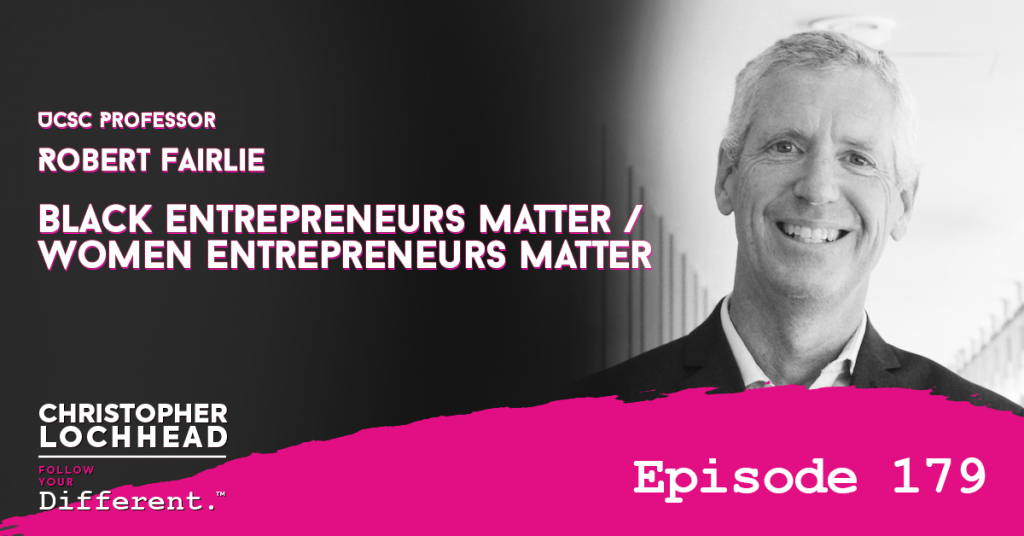
Podcast: Play in new window | Download (Duration: 52:30 — 36.0MB) | Embed
Subscribe: Apple Podcasts | Spotify | Pandora | RSS | More
Why is there a disproportionate impact against Black-owned and Women-owned Businesses?
Today in Follow your Different, Robert Fairlie, a professor at the University of California and a researcher for the National Bureau of Economic Research, shares his research on the impact of Coronavirus on small businesses and black and women-owned businesses.
Impact of COVID-19
Rob shares the alarming figures that small businesses faced. From 15 million active businesses to 12 million, to the 15% unemployment rate in just one month (Bureau of Labor Statistics), Rob gives us facts and figures how devasting Covid-19 has impacted businesses.
“I think they are starting to get become more attention focused on the business side of it and the importance of business owners. Not only do they create a route out of poverty or an alternative for income but they also create jobs.” – Rob Fairlie
Impact on Black-owned Businesses
Prof. Farlie says that there is a hugely disproportionate impact between White-owned businesses and African American-owned businesses. According to the data found from February to April, there’s a 41% decrease of active African-American business owners compared to a 17% decrease of active White business owners.
“I’m just worried that this is going to increase racial inequality and gender inequality. It’s not just going to be for a few months as we deal with COVID, but it’s going to be longer. Retirements kind of maybe setting us back and that’s a bigger, much bigger worry.” – Rob Fairlie
Impact on Women-owned Businesses
One of the reasons why there is a bigger drop in women-owned businesses is because they are in industries that cater to personal services that were shut down because of health risks. Another reason is that women-owned businesses are often smaller in scale and they do not have the resources to face all the regulations to operate during the pandemic.
“There has been some new research and I’m working with a couple of co-authors to try to do a little more work on this. This shows that mothers are taking a disproportionate hit compared to fathers in terms of reducing their hours of work, dealing with children, dealing with homecare. This isn’t just evidence from the US, this is evidence from a lot of countries around the world.” – Rob Fairlie
To learn more about Prof. Rob Fairlie and the impact of COVID-19 on Black and Women-owned businesses, download and listen to this episode.
Bio:
Robert Fairlie is Professor of Economics at the University of California, Santa Cruz and Research Associate, NBER.
His research interests include entrepreneurship, education, information technology, inequality, labor economics, and immigration.
Further, he received his Ph.D. and M.A. from Northwestern University and B.A. with honors from Stanford University.
In addition to this, he has held visiting positions at Stanford University, Yale University, UC Berkeley and Australian National University. He has received funding for his research from numerous government agencies and foundations.
He has testified to the U.S. Senate, U.S. House of Representatives, U.S. Department of Treasury, and the California State Assembly regarding the findings from his research, and received a joint resolution from the California Legislature.
Links:
UCSC Economics Faculty: Professor Robert Fairlie
Research Papers on Impacts of COVID-19 on Small Business Owners
Senate Bill referencing research
THE IMPACT OF COVID-19 ON SMALL BUSINESS OWNERS: EVIDENCE OF EARLY-STAGE LOSSES FROM THE APRIL 2020 CURRENT POPULATION SURVEY
IZA Institute of Labor Economics: Robert Fairlie
We hope you enjoyed this episode of Follow Your Different™! Christopher loves hearing from his listeners. Feel free to email him, connect on Facebook, Twitter, Instagram, and subscribe on iTunes!
178 Transforming Education In The Era of Covid w/ Ted Dintersmith, Bestselling Author

Podcast: Play in new window | Download (Duration: 1:26:09 — 59.2MB) | Embed
Subscribe: Apple Podcasts | Spotify | Pandora | RSS | More
Today, we have a legendary conversation about schools and education. This is a topic that is not getting enough attention right now. With us today is Ted Dintersmith, the author of a great book called What School Could Be: Insights and Inspiration From Teachers Across America.
We talk about how we can make school work, especially today that we have a new reality. Ted has some powerful insights and some great ideas about that. We even get into how to make the weirdest school year in modern history as an opportunity to reimagine school and reimagine learning.
What School Could Be
Ted was with us back in 2019, at Episode 117, shortly after his book came out and he’s back as Chris digs into one of two important issues that we face today during Covid19, education. The other topic he will dive deep into is entrepreneurship. (Watch out for the next episode with the University of California. Santa Cruz, Professor Rob Fairley)
He’s been talking to a lot of the top educators in the country. Further, he gives us insights as we are standing on the edge of the new school year. If you care about our future, if you care about kids, if you care about education, I think you’re going to love this conversation with Ted.
Non-traditional Methods of Learning
Ted shares with Christopher how he checked back with parents, teachers, school administrators, and students when Covid19 started. One outstanding finding he got was that those who were practicing non-traditional methods of learning were optimistic during this time.
“The kids they work with were really good — pre-COVID — on identifying what they wanted to learn, turning that into an initiative. They wanted to manage their own time and draw out appropriate resources, other adults’ online stuff, and then sticking with it until they proved something they cared about. In my book, with no sense of a looming pandemic. I said this is a really important skill for adults.” – Ted Dintersmith
Anxiety and Stress
This time has caused much anxiety and stress for teachers and school administrators. There is no right formula and it involves a lot of variables in deciding how to operate schools come September.
Chris and Ted also discussed how “inconvenient” this set-up is for those who can privileged, but how devastating this set-up could be for a single-parent, juggling multiple jobs.
“Even if you had a great plan to reopen, it requires money. Now, you just start marching through everything that has to be done safely for you to say, here’s our plan to reopen. Here’s an effective transportation plan. Here’s an effective disinfected plan. Here’s how we’re going to staff classrooms, here’s what would happen to our students. Here’s how we’re going to add nurses on call. You look at everything that’s required and then you say, ‘oh, by the way, do it with even fewer budget dollars because state local budgets have been hammered.” – Ted Dintersmith
To know more about Ted and how school could be during Covid19, download and listen to this episode.
Bio:
Links:
We hope you enjoyed this episode of Follow Your Different™! Christopher loves hearing from his listeners. Feel free to email him, connect on Facebook, Twitter, Instagram and subscribe on iTunes! Get amazing, different stories on business, marketing, and life. Subscribe to our newsletter The Difference.
177 God: A Different Dialogue | Pastor Dave Ferguson
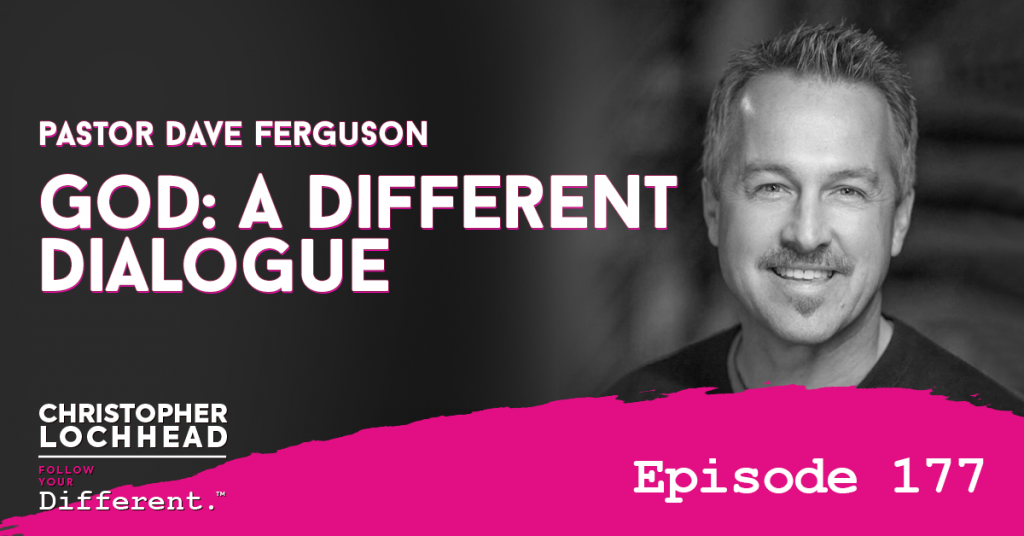
Podcast: Play in new window | Download (Duration: 1:45:58 — 72.8MB) | Embed
Subscribe: Apple Podcasts | Spotify | Pandora | RSS | More
Now you might be asking, why are we dealing with God on a business podcast? Well, first of all, if you’re a regular listener, you should know this is no normal business podcast. When this crisis started, we decided to steer right into this crisis, to frankly, help and scale ourselves to meet the challenge of this time.
In this episode, Pastor Dave Ferguson joins us to talk about God. He is an award-winning author and the founder/lead pastor of Chicago’s Community Christian Church. His book Hero Maker: Five Essential Practices For Leaders To Multiply Leaders is a must-read. Pay special attention to pastor Dave’s thoughts on what he thinks God wants for all of us.
Evil Cloaking As Christians
Chris shares with Pastor Dave what has been occupying his mind and heart in the past months. Aside from another recent family accident, Chris shares how the case of the murder of his best friend has finally come to a close. The Santa Cruz police brought his murder to justice after they captured the four murderers.
“The other thing you should know is, my dear friend Tushar, was a — and these are his words — a brown guy. They [murderers] we’re young, 19, 22, and 23. These men who murdered Tushar are white Baptists from Southern California.” – Christopher Lochhead
Too Much Evil In The World
Chris shares he does not expect anything from the baptist church, but at least a public denouncement of evil, especially after they learned that these murderers belonged to the said church. In fact, the father of one of the criminals is a pastor.
“But just like with the discussion around the police, Pastor Dave, are there bad police? Yes, there are. Are there bad Muslims? Yes, there are. Are there bad Christians? Yes, there are bad human beings. Evil is a very real thing.” – Christopher Lochhead
Having Important Conversations
Pastor David recounts to Chris a few stories he had about the racial disparity and the clamor for equality. He spoke about African-American pastors and colleagues and about his parents (also pastors) who also joined the movement to have important conversations in their congregation.
Pastor David also shares what he asks others from other people who are searching for meaning.
“For people that are really sincerely seeking, I’m going like ‘just continue to search that, continue to pursue that. If it’s real, because we’re talking about God, in this case, he’ll make himself real to you.’ In fact, I’ll even sometimes challenge people, ‘hey, take 30 days and just pray ‘God, if you’re real, make yourself real to me.’ There have been enough times in your history where God has proven himself real. He’s taking you down a really good path. He has consistently shown up.” – Pastor Dave Ferguson
To know more about God from a completely different kind of dialogue with Pastor Dave Ferguson, download and listen to this episode.
Bio:
Dave Ferguson is an award-winning author, founding and lead pastor of Chicago’s Community Christian Church, a missional multi-site community considered one of the most influential churches in America.
Dave is also the visionary for the international church-planting movement NewThing and president of the Exponential Conference.
You can get more information about Dave at www.daveferguson.org or check out his latest book, Hero Maker.
Links:
Book: Hero Maker: Five Essential Practices for Leaders to Multiply Leaders (Exponential Series)
We hope you enjoyed this episode of Follow Your Different™! Christopher loves hearing from his listeners. Feel free to email him, connect on Facebook, Twitter, Instagram, and subscribe on iTunes!
073 Noble Purpose
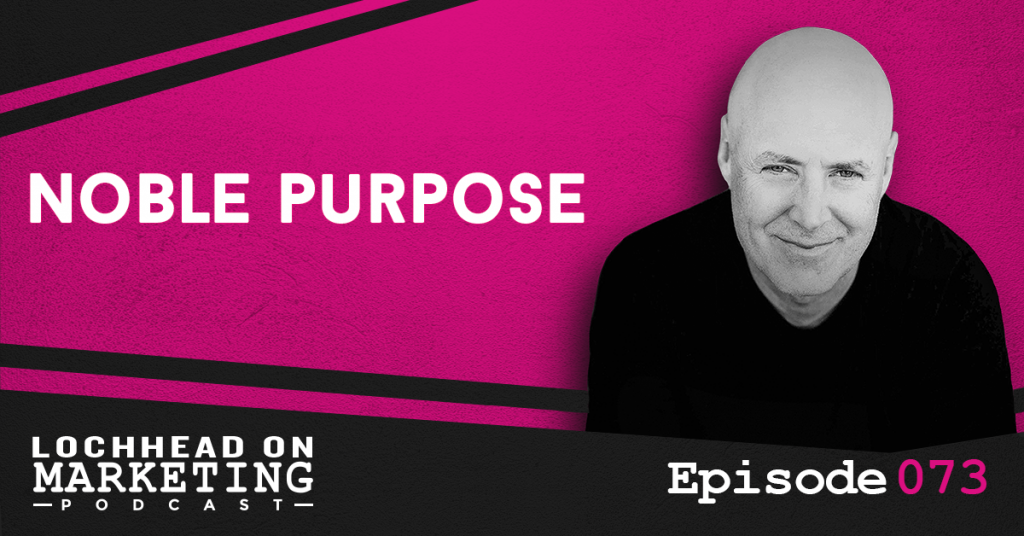
Podcast (lochheadonmarketing): Play in new window | Download (Duration: 11:46 — 8.1MB) | Embed
Subscribe: Apple Podcasts | Spotify | RSS | More
As this theme kept on coming up in Follow Your Different episodes, whether he spoke with entrepreneurs or venture capitalists, Christopher decided to finally talk about the purpose of business. Specifically, he dives into what his friend Gil Spencer calls a noble purpose and how noble purpose can tie to building categories companies brands.
Mission-Driven and Mercenaries
A noble purpose is a cool way of thinking about things that we do hear about in business and entrepreneurship. Sequoia Capital and many others, talks about it a lot. The discussion revolves around this notion of being mission-driven. Are you a mission-driven entrepreneur?
Similarly, Eddie Yoon, who has been a guest many times on my podcasts, shares about the distinction between missionaries and mercenaries.
“People who are on a mission will literally crawl through flaming glass — if that’s even a thing — to achieve their goal because they’re up to something, and no matter how much you pay a mercenary, when the going gets tough, many mercenaries will tap out.” – Christopher Lochhead
What Is Your Noble Purpose?
Chris shares a few more examples of companies and brands and how their noble purpose differentiated them and allowed them to dominate their categories. He spoke about TOM’s shoes. Another example he shares is about Patagonia, which is an environment-based company.
“Regardless of how you think about it, I think now’s a good time to think about what’s your noble purpose? Specifically, can you tie this notion of noble purpose mission-driven being a missionary to the design and development of your category and brand?” – Christopher Lochhead
Mission-Driven Entrepreneurs
Marc Benioff, CEO of Salesforce, is a proud supporter of LGBTQ+ rights movement. Vala Afshar of Salesforce shared about their noble missions in Follow Your Different Episode 116.
“Now’s a great time to think about what’s your noble purpose. Are we up to something greater than just making money and believe me, I’m a fan of making money. If you want to use this moment in time to clarify your noble purpose, why not think about how you can tie your noble purpose, to your category design, to your marketing, and maybe even to some level Have activism around topics that you think are important?” – Christopher Lochhead
To hear more about finding your noble purpose, download and listen to this episode.
Bio:
Christopher Lochhead is a #1 Apple podcaster and #1 Amazon bestselling co-author of books: Niche Down and Play Bigger.
He has been an advisor to over 50 venture-backed startups; a former three-time Silicon Valley public company CMO and an entrepreneur.
Furthermore, he has been called “one of the best minds in marketing” by The Marketing Journal, a “Human Exclamation Point” by Fast Company, a “quasar” by NBA legend Bill Walton and “off-putting to some” by The Economist.
In addition, he served as a chief marketing officer of software juggernaut Mercury Interactive. Hewlett-Packard acquired the company in 2006, for $4.5 billion.
He also co-founded the marketing consulting firm LOCHHEAD; was the founding CMO of Internet consulting firm Scient, and served as head of marketing at the CRM software firm Vantive.
Links:
116 Dreamforce Special w/ Salesforce’s Vala Afshar
024 The Difference Between a First Mover and a Category Creator w/ Eddie Yoon
We hope you enjoyed this episode of Lochhead on Marketing™! Christopher loves hearing from his listeners. Feel free to email him, connect on Facebook, Twitter, Instagram, and subscribe on Apple Podcast! You may also subscribe to his newsletter, The Difference, for some amazing content.
176 What is going on? | #1 Tech Analyst R “Ray” Wang Chairman Constellation Research
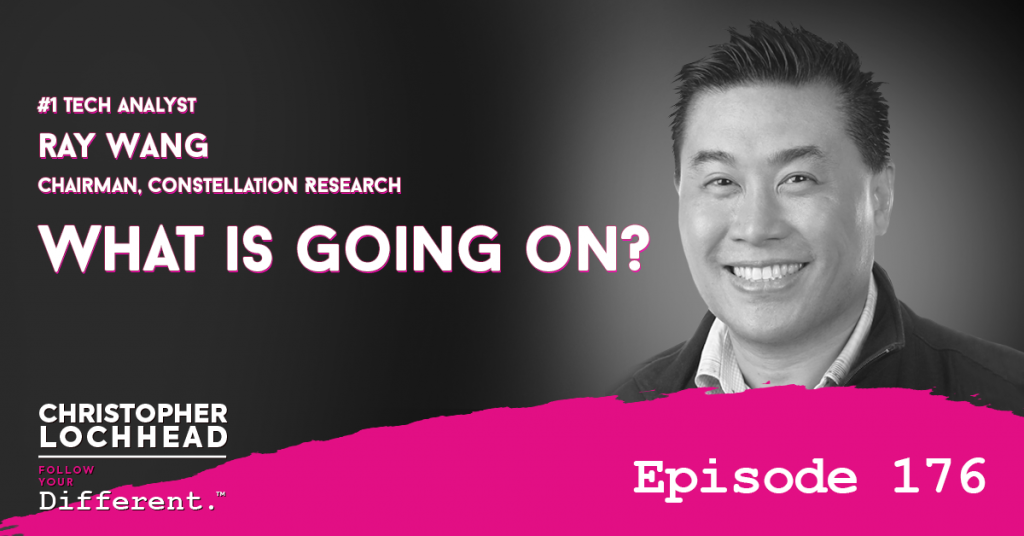
Podcast: Play in new window | Download (Duration: 1:14:00 — 50.8MB) | Embed
Subscribe: Apple Podcasts | Spotify | Pandora | RSS | More
In this episode, we have an amazing conversation with the world’s number one tech analyst, Ray Wang. He’s the founder of Constellation Research and the author of a spectacular, bestselling book called Disrupting Digital Business. We talk about what’s going on with C19, is C 19 a bioweapon, and what’s going on with bioweapons. We also talk about the digital giants and stock investing. Additionally, we talked about the future of enterprise tech and much more.
Is C19 A Bioweapon?
As a fan of conspiracy theory, Chris asked if indeed, Covid19 is a bioweapon. Ray shares it has not yet been addressed as of the moment but deconstructing the DNA of Covid19 says otherwise. He raised a serious call for treaties among countries as bioweapons are not a thing of the future.
“Do we have offensive or defensive capabilities? And the thought crosses through every government’s mind as to, what’s required? What’s within the limits? What treaties have we signed? So I don’t think it was intentional. I think the safety protocols were definitely broken. I think it’s not necessarily something they were planning to unleash. But it was something that they were studying.” – Ray Wang
Currency Crisis and Cryptocurrency
Ray also shares some of his views about the current “devaluing of dollars.” They also touched on the efforts of China and Russia to push forward the use of cryptocurrencies. Ray foresees issues with the use of cryptocurrencies, from currency exchange manipulation to funding of terrorists and untraceable purchase of ammunition.
“We’re seeing some massive shifts, and it’s really the attack on the dollar that has been happening for some time. It’s as if everybody is not in favor of the dollar being the world’s reserve currency.” – Ray Wang
Ransomware Gangs
Chris and Ray talk about some recent events where some personalities’ Twitter accounts got hacked and were asked to send back Bitcoin to get back their accounts. Aside from this, Ray shares a much deeper kind of attacks they receive, targeted to tech professionals like him.
“We have insider threats, people inside companies that have either been placed, recruited, or turned. I’ll say that again. They’ve been placed, recruited, scooted, or turned to work against the US, the country or a corporation. And this, we have cyber ransom spies going to work for government agencies and or corporations, with the foreign government agencies, whether knowingly or unknowingly, they have been told that, ‘hey, if you just stick into the drive over here, for a bunch of zero-day vulnerabilities, which we’ve packaged together very well, you can take out entire networks. And you can do your part, you know, in part of the revolution, or whatever revolution you’re in.’” – Ray Wang
To know more about Ray Wang and what’s going on in the world and tech world today, download and listen to this episode.
Bio:
R “Ray” Wang (pronounced WAHNG) is the Principal Analyst, Founder, and Chairman of Silicon Valley-based Constellation Research, Inc.
He’s also the author of the popular business strategy and technology blog “A Software Insider’s Point of View”.
With viewership in the 10’s of millions of page views a year, his blog provides insight into how disruptive technologies and new business models such as digital transformation impact brands, enterprises, and organizations.
Wang has held executive roles in product, marketing, strategy, and consulting at companies such as Forrester Research, Oracle, PeopleSoft, Deloitte, Ernst & Young, and Johns Hopkins Hospital.
His new best selling book Disrupting Digital Business, published by Harvard Business Review Press and now globally available provides insights on why 52% of the Fortune 500 have been merged, acquired, gone bankrupt, or fallen off the list since 2000.
In fact, this impact of digital disruption is real. However, it’s not the technologies that drive this change. It’s a shift in how new business models are created.
Wang has held executive roles in product, marketing, strategy, and consulting at companies such as Forrester Research, Oracle, PeopleSoft, Deloitte, Ernst & Young, Personify, and Johns Hopkins Hospital. He is a prominent and dynamic keynote speaker and research analyst working with clients on digital, innovation, business model design, engagement strategies, customer experience, matrix commerce, and big data.
His Silicon Valley research firm, Constellation Research, Inc., advises Global 2000 companies on the future, business strategy, and disruptive technology adoption.
Ray is a regular contributor to Harvard Business Review and well quoted in The Wall Street Journal, Forbes, Bloomberg, CNBC TV, Reuters, IDG News Service, and other global media outlets. Wang has thrice won the prestigious Institute of Industry Analyst Relations (IIAR) Analyst of the Year Award.
Links:
Constellation.com – R Ray Wang
Personal Log: Understanding Case Fatality Rates For #COVID19 #CoronaVirus
We hope you enjoyed this episode of Follow Your Different™! Christopher loves hearing from his listeners. Feel free to email him, connect on Facebook, Twitter, Instagram, and subscribe on iTunes!
175 The Startup Community Way w/ Brad Feld
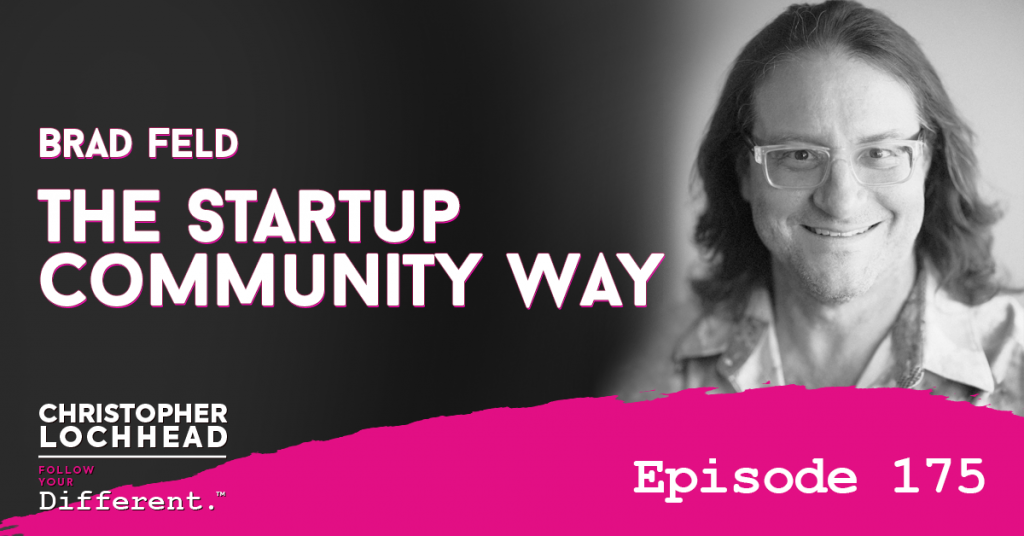
Podcast: Play in new window | Download (Duration: 1:10:44 — 48.6MB) | Embed
Subscribe: Apple Podcasts | Spotify | Pandora | RSS | More
Today, we continue our run on top venture capitalists with none other than the legend, Brad Feld. He’s the co-founder of Foundry Group and Tech Stars. He’s on the Forbes Midas List and a Top Five Investor. He has a new book called The Startup Community Way.
We have wide-ranging conversations from C19, making sense of this time of hyper change complex adaptive systems, the future of startups Silicon Valley and work, and why Brad is not leaving his house. Pay special attention to Brad’s thoughts on how to deal with an unpredicted situation and where it can feel like we have a lot less control.
The Three Crises
Brad shares what’s on his mind at the moment, how he has stepped forward to help the governor of Colorado without leaving the confines of his home, and how he has pondered upon the three crises of the world today.
“I referred to the health crisis, which is COVID, which generated an economic crisis, which we wouldn’t have had otherwise, our economy was very strong, which has generated a mental health crisis and which is subsequently generated. racial equity crisis. All of these things are interacting with each other.” – Brad Feld
Complex Adaptive Systems
Brad shares how he realized that all of these crises were complex systems. In fact, in his book, The Startup Community Way, he bases the entire framework of how startup communities develop and evolve on complexity theory and the notion of complex adaptive systems.
“I’ve really been soaked in that intellectually, not just in the COVID crisis, not just in the book, not just in all the dynamics around the businesses that I’m involved in, and I’m an investor in, but just sort of thinking about how as humans, we do such a bad job of understanding how to interact with complex systems. We want everything to become deterministic, linear or well defined and the vast majority of stuff we interact with isn’t.” – Brad Feld
Simple and Complex Systems
Simple is making a coffee drink, complicated is designing a Boeing airplane, or conducting a business audit, and complex is raising a child.
“I think a lot of people have been operating against the backdrop of believing that a lot of things are deterministic and predictive, and trying to function in a way where that is not natural. As humans, we want to control stuff. You want to understand what it is you want to do, fix things so that you’re not fighting against them and you want to get to an outcome and you want to set a goal and make a goal.” – Brad Feld
To know more about Brad Feld, download and listen to this episode.
Bio:
Brad Feld is co-founder of the Foundry Group and has been an early-stage investor and entrepreneur since 1987.
Brad previously co-founded Mobius Venture Capital and Techstars, and prior to that, founded Intensity Ventures.
Feld was an early investor in Harmonix, Zynga, MakerBot, and Fitbit.
A writer and speaker on venture capital investing and entrepreneurship, Brad has written a number of books as part of the Startup Revolution series, and writes the blogs Feld Thoughts and Venture Deals.
He currently is chair of the National Center for Women & Information Technology and on the boards of Path Forward, the Kauffman Fellows, and Defy Ventures.
Brad holds a Bachelor of Science and Master of Science degrees in Management Science from MIT.
An art collector and long-distance runner, he has completed 25 marathons as part of his mission to finish a marathon in each of the 50 U.S. states. He lives in Boulder, Colorado.
Links:
The Foundry Group Team – Brad Feld
We hope you enjoyed this episode of Follow Your Different™! Christopher loves hearing from his listeners. Feel free to email him, connect on Facebook, Twitter, Instagram, and subscribe on iTunes!
072 Designing Legendary Categories, Companies & Brands w/ Michelle Stacy
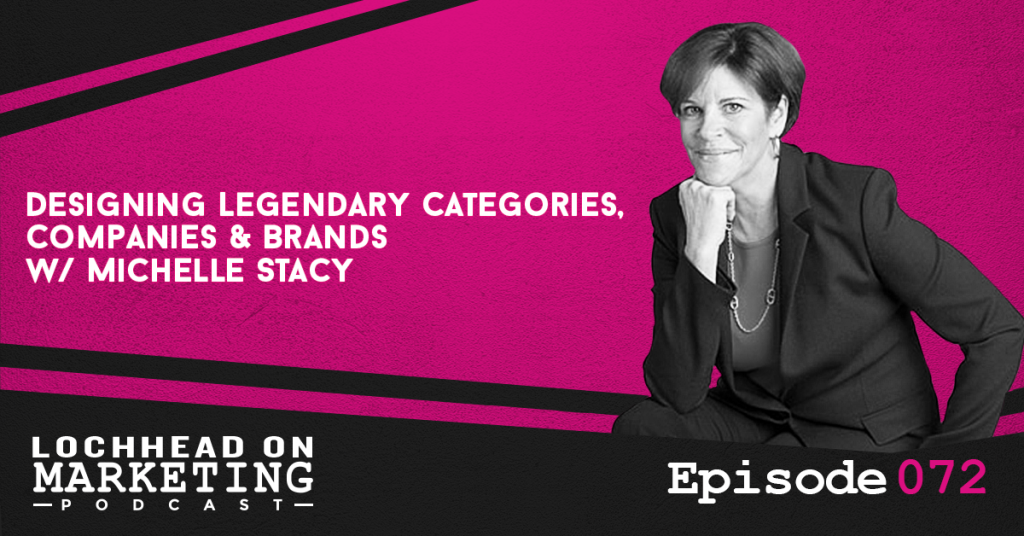
Podcast (lochheadonmarketing): Play in new window | Download (Duration: 52:15 — 35.9MB) | Embed
Subscribe: Apple Podcasts | Spotify | RSS | More
Today, Chris goes deep on how to design a legendary category, company product, and brand with his super special guest, Michelle Stacy. Michelle is a living consumer product marketing legend, honing her craft with brands such as Gilette, Oral B, Keurig, and now, HydraFacial.
Putting Consumers First
Michelle spent many years honing her craft at Gillette where she led Oral B. She launched a number of great new products including the Pulsar battery powered manual toothbrush. She was the President of Keurig from 2010 to 2014, where the business grew from less than $1 billion in revenue to 4.5 billion.
Through her leadership, she took Keurig from being a category-defining product to becoming — what we, in tech call — a platform. She did this when they started inviting in the competition to sell their coffee for Keurig machines. Additionally, she’s been a board member at iRobot, Coravin (a legendary wine preservation system), and Hydrafacial (Clint Carnell CEO on FYD #160)
“I think what always resonates with me is putting the consumer first and trying to think through ‘how do I make an emotional connection between what I want the consumer to buy and the product itself.’ To me, that’s where longevity happens around products. When you can get a consumer to fall in love with your product, then you have the opportunity, to as you would put it, become a Category King.” – Michelle Stacy
The Keurig Story
Michelle started working with Keurig in November 2008, more or less the onset of the global financial crisis. She found herself contemplating if she could ever push forward a premium-priced business given the financial crisis at that time. With consumers in mind and with the right launch plan, they successfully introduced a well-loved product.
“Keurig was actually the fifth single-serve company to market. They’re just the ones that got it right.” – Michelle Stacy
Creating Momentum
In this episode, Michelle walks us through the process of developing and launching Keurig machines. She mentions initially offering this to client-facing businesses, then slowly grew to every home through word of mouth. They also knew that customers do not like to be tied into a single brand of coffee, so they explored tying up with different coffee brands for their K-cups.
“In my DNA is the concept of looking at how you create value in every step of your environment so that you’re creating value for the consumer, you’re conveying value for the retailer, you’re creating value for your suppliers that are supplying you with the product. So as everyone benefits within an ecosystem, it creates momentum.” – Michelle Stacy
To know more about designing legendary categories and to know more about Michell Stacy, download and listen to this episode.
Bio:
Michelle is a strong leader whose personal and professional skills have developed over a 35-year career. Keurig, Gillette, and P&G have all benefited from her ability to develop and articulate a clear vision and strategy, build brands, and identify avenues for growth.
Michelle’s key to managing and driving exceptional growth has been her ability to create a positive and focused culture that generates high employee engagement, as well as talent for creating company-wide commitment to lead with a higher purpose.
A few of the brands that Michelle has impacted include:
The Gillette Series
Gillette Mach3
Oral-B
Oral-B Stages
Keurig
Links:
We hope you enjoyed this episode of Lochhead on Marketing™! Christopher loves hearing from his listeners. Feel free to email him, connect on Facebook, Twitter, Instagram, and subscribe on iTunes! You may also subscribe to his newsletter, The Difference, for some amazing content.
174 Intentional Integrity | Rob Chestnut, former Airbnb Chief Ethics Officer
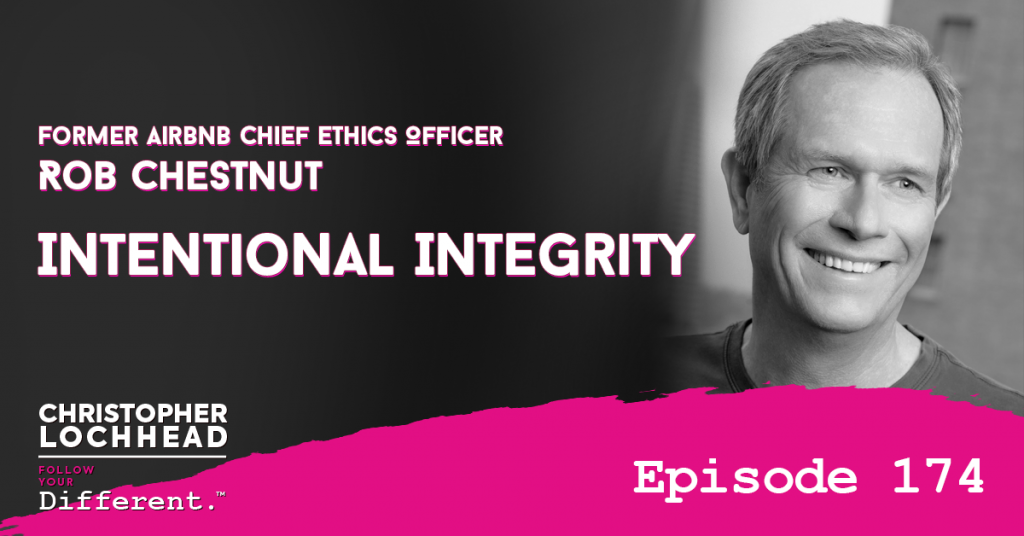
Podcast: Play in new window | Download (Duration: 54:16 — 37.3MB) | Embed
Subscribe: Apple Podcasts | Spotify | Pandora | RSS | More
In this episode, our host Christopher Lochhead speaks with Rob Chestnut on why integrity matters more than ever. Rob is the former chief ethics officer of Airbnb and the author of the new book Intentional Integrity.
Chris and Rob go deep on strategies for handling a crisis and how leaders have to deal with the speed required in this age of canceled culture to get positive results. They talk about what exactly a chief ethics officer is, and why more companies are adding the position. Pay special attention to what Rob says about corporate MBAs and his thoughts on what the work world looks like after C19.
Coping With Change
Rob shares that the world is changing so rapidly. He says that he admires how we, especially kids, are coping with this incredible rate of change. He also shares the changes in leadership both corporations and governments.
“I think the world is moving toward integrity, though. There’s a connectedness that has led all of us to think about others in ways that maybe we haven’t been thinking about people in the past.” – Rob Chestnut
Cancel Culture
Christopher shares a recent incident in a Santa Cruz restaurant and how it got a taste of “cancel culture” from its customers and employees, Rob shares his insights into this current movement, where employees and customers rally online.
“Customers want to do business with businesses that share their values. Employees want to work in places that share their values. What we’re seeing more and more is, if there’s a mismatch, customers leave. Customers will leave very quickly and move their business elsewhere. If they perceive a business that isn’t in line with their values. The same thing with employees, more than ever today.” – Rob Chestnut
Chief Ethics Officer
Rob also shares what a chief ethics officer does. Rob shares it is important for employees to know that someone is standing up and speaking about issues. He shares how this was implemented in Airbnb who has 5000 employees now.
“The chief ethics officer does not make a company ethical, and a company doesn’t need a chief ethics officer to be ethical. That role can help drive integrity into the culture of the company, by being the spokesperson on the leadership team, for ensuring that the company doesn’t lose sight of its Northstar, of its purpose and its mission and to ensure that the company is thinking about all of this different shareholder, stakeholders, employees and alike.” – Rob Chestnut
To know more about Rob Chestnut and intentional integrity, download and listen to this episode.
Bio:
Rob Chesnut is the general counsel at Airbnb Inc.
As Senior Vice President and General Counsel for Chegg, Rob oversees the company’s corporate and legal relations.
Rob brings over twenty-five years of legal experience from high profile e-commerce and technology companies.
Prior to Chegg, Rob served as the Senior Vice President and General Counsel for LiveOps, Inc., a leading provider of call center outsourcing services. Before LiveOps Inc., he worked as eBay’s Senior Vice President of the Trust and Safety Department, where he oversaw the development of the company’s global detection infrastructure.
With extensive experience in the U.S. Justice Department, Rob is the recipient of the Department’s John Marshall award for litigation, and the CIA’ Outstanding Service Medallion.
When he’s not working, Rob loves to spend time with his family or head out to the golf course.
Links:
Intentional Integrity: How Smart Companies Can Lead An Ethical Revolution
We hope you enjoyed this episode of Follow Your Different™! Christopher loves hearing from his listeners. Feel free to email him, connect on Facebook, Twitter, Instagram, and subscribe on iTunes!
173 A Unique American Perspective w/ MK Palmore, Marine, FBI Exec & Cybersecurity Advisor
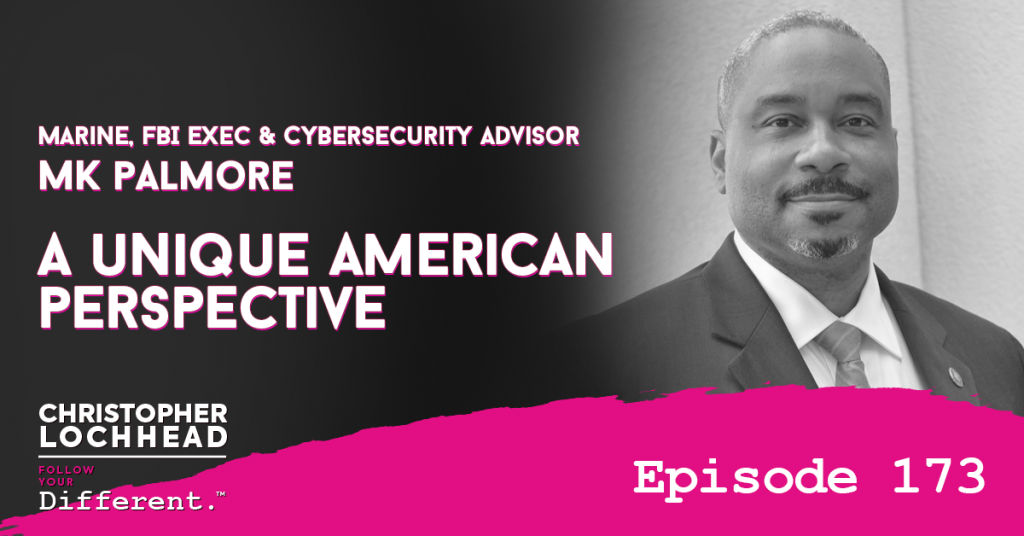
Podcast: Play in new window | Download (Duration: 1:19:10 — 54.4MB) | Embed
Subscribe: Apple Podcasts | Spotify | Pandora | RSS | More
We listen today to an extraordinary and unique perspective on what is happening in the United States right now. Our guest, the legendary MK Palmore, whose entire background positions him to be a leader of this moment that we all find ourselves in.
Not only does MK have this incredible career as a Marine, as an FBI agent, now, but he’s also a Silicon Valley-based executive at a major tech company. He is African American and his perspective on our world right now is like none other I have seen or heard, and we go deep on all of it. This is a very powerful conversation we hope gets heard by many.
To Serve and To Protect
Coming from a solid law enforcement background, MK shares the conversations that he is having with his former colleagues. He mentions that there should be an understanding about the basic concept of “being called to serve and protect” among law enforcers. Unfortunately, a number of law enforcers have a different agenda other than this core mission.
“It requires, again, an understanding that, ‘hey, a potential problem exists.’ This is from law enforcement to the other side [minorities]. We need to be willing to listen so that we can make adjustments to how it is that we go about policing, which I think will be a huge challenge.” – MK Palmore
Police-ing Is Extremely Hard Work
MK describes the demands of police work. There are certain challenges involved in that profession that don’t lend themselves to flow judgments. As these recent situations arise, he believes that there should probably be some training changes that need to happen on the law enforcement side.
“Law enforcement officers are trained in a particular way so that they can make quick judgments or assessment of situations so that they can mitigate and bring down a situation as quickly as possible, to de-escalate a situation quickly as possible.” – MK Palmore
Comprise To Let Healing Begin
MK shares how strong leadership is needed to talk about issues and to compromise. This is the only route where healing can begin. He shares his experiences as an African American former FBI agent and now a Tech professional and how he contributes to the current issues.
“While I do not believe that there is an explicit racism present in law enforcement, I do believe that there is implicit racism in our society. To believe that law enforcement is somehow immune to this, I think, is misplaced.” – MK Palmore
To know more about MK Palmore, a Marine, FBI Exec & Cybersecurity Advisor and his unique American perspective, download and listen to this episode.
Bio:
MK was born and raised in Washington, D.C. It’s no surprise he was influenced daily and at an early age by the formative sights and sounds of our government at work.
As a youth, he had already decided to embark on a career of service. This led him to the shores of Annapolis, where he was a midshipman at the United States Naval Academy, and afterward as a commissioned officer in the United States Marine Corps.
Following his military service, MK began a 22-year journey as a Special Agent of the Federal Bureau of Investigation (FBI), a key player behind numerous high-level investigations and an early combatant in the fight against cybercrime.
During this impressive career of public service, MK honed his leadership skills, rounding out his tenure in an executive position leading the cybersecurity investigative teams of FBI San Francisco.
Links:
We hope you enjoyed this episode of Follow Your Different™! Christopher loves hearing from his listeners. Feel free to email him, connect on Facebook, Twitter, Instagram, and subscribe on iTunes!

